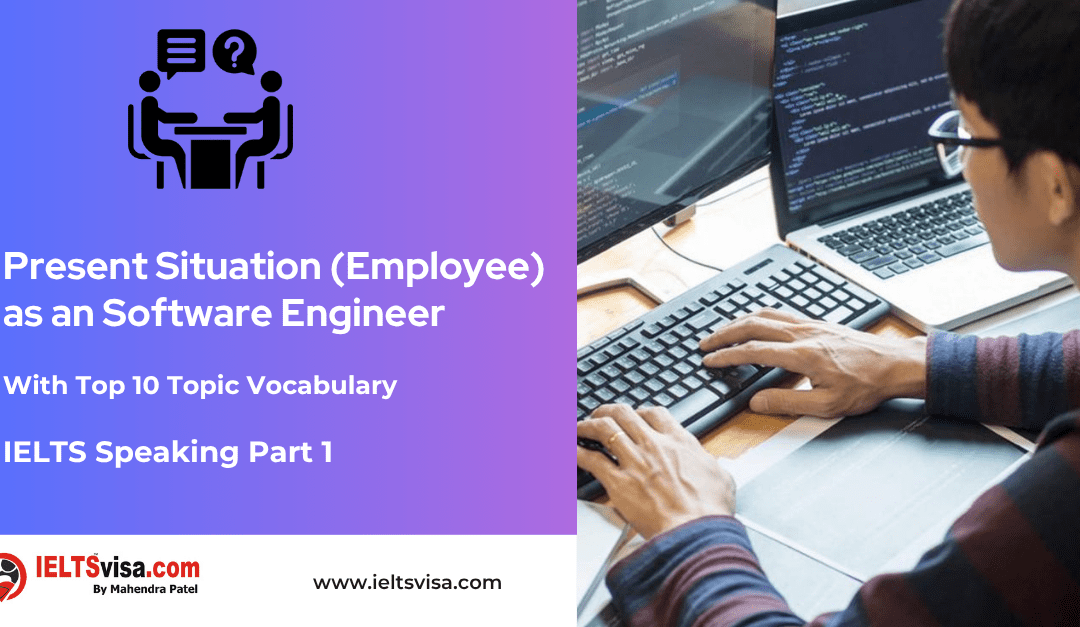IELTS Speaking Part 1 – Present Situation (Employee) as a Software Engineer
Working Person Scenario as a Software Engineer
- Bachelor’s degree in Computer Application.
- Graduated in 2020 from XYZ University.
- Started working as a Software Engineer in May 2020
- He wants to migrate abroad, and my first preference is the USA, then Australia, and then Canada
- Got married in 2023 and living with a joint family.
- His wife is a nurse, and she has been working since 2023 once she graduated.
Q: Do you have a degree? If so, when and where did you graduate?
A: Yes, I have a Bachelor’s degree in Computer Application. I graduated from XYZ University in 2020.
Q: What impressed you most when you were at university?
A: I was most impressed by the quality of the faculty and the advanced facilities available. The professors were highly knowledgeable and experienced, and the labs were equipped with the latest technology, which provided a great learning environment.
Q: Do you still remember your school days?
A: Yes, I have fond memories of my school days. They were some of the best times of my life, filled with learning, making friends, and participating in various activities and events.
Q: What do you do for a living?
A: I work as a software engineer for a technology company.
Q: Describe your job in detail.
A: As a software engineer, I design, develop, and maintain software applications. My work involves coding, testing, debugging, and collaborating with other team members to ensure that the software meets the client’s requirements and is delivered on time. I also attend meetings to discuss project progress and updates.
Q: Is your job important to you?
A: Yes, my job is very important to me. It is both challenging and rewarding, and I enjoy creating solutions that help people and businesses. Additionally, it provides me with a sense of accomplishment and financial stability.
Q: If you could, would you change jobs?
A: At the moment, I am satisfied with my job. However, I am open to new opportunities that might offer better prospects for career growth and personal development, especially if they are abroad.
Q: Are there possible changes that could affect your job in any way?
A: Yes, technological advancements, changes in industry standards, or shifts in market demand could affect my job. Staying updated with the latest trends and continuously improving my skills are essential to remain relevant in this field.
Q: Could you tell me something about your family?
A: I live with my joint family, which includes my parents, my wife, and my younger brother. My wife is a nurse, and we got married in 2023. Living in a joint family provides a great support system and a sense of togetherness.
Q: How does your family feel about you going abroad?
A: My family is very supportive of my decision to migrate abroad. They understand that it could provide better career opportunities and improve our quality of life. While they would miss me, they encouraged me to pursue my dreams and aspirations.
Q: What are your primary responsibilities?
A: My primary responsibilities include developing software applications, ensuring the code is efficient and bug-free, collaborating with other developers and stakeholders, and staying updated with the latest technological advancements.
Q: What do you do every day?
A: Every day, I start by checking emails and reviewing any updates or issues from the previous day. I then focus on coding, testing, and debugging software. I attend team meetings to discuss project progress and collaborate with colleagues on different tasks.
Q: What are your duties?
A: My duties involve writing and testing code, debugging and resolving technical issues, participating in code reviews, and collaborating with team members to ensure the timely and quality delivery of software projects.
Q: What is your daily routine?
A: My daily routine involves starting work around 9 AM, coding and testing software, attending team meetings, and troubleshooting issues. I usually wrap up my workday by 6 PM, but sometimes I work longer if there are pressing deadlines.
Q: What does your job involve?
A: My job involves designing software solutions, writing and testing code, debugging issues, collaborating with other developers and stakeholders, and continuously learning to keep up with technological advancements.
Q: How many people does your firm employ at present?
A: My firm employs around 300 people, with a team of about 50 in the software development department.
Q: Can you have some time off whenever you want?
A: While I can request time off, it usually needs to be planned in advance to ensure that project timelines and team coverage are maintained. Emergency situations are an exception where immediate time off might be granted.
Q: Why don’t you apply for another job? A: I am currently satisfied with my role and the professional growth opportunities. The company supports my career development, and I have a good rapport with my colleagues and supervisors.
Q: Have you filled in the application form? A: Yes, I have filled in the application form for the migration process to the USA, as I am looking to explore new opportunities abroad.
Q: If they offer you a well-paid job, will you take it? A: Yes, if the job aligns with my career goals and offers good prospects for professional growth, I would certainly consider it.
Q: How much holiday do you get? A: I get about four weeks of paid holiday per year, which allows me time to relax and spend quality time with my family.
Q: What are normal working hours for most office jobs in your country? A: Normal working hours for most office jobs in my country are typically from 9 AM to 6 PM, Monday to Friday.
Q: What kind of jobs get very high salaries in your country? A: Jobs in fields such as information technology, medicine, finance, and engineering tend to get very high salaries in my country. Senior management positions also command high salaries.
Q: What is the minimum income tax amount you must pay?
A: The minimum amount of income tax varies based on income levels and government regulations, but generally, a certain percentage is deducted from salaries as income tax.
Q: What jobs often involve shift work? Would you like to do one?
A: Jobs in healthcare, manufacturing, and customer service often involve shift work. Personally, I prefer a standard working schedule as it allows for a better work-life balance.
Q: Is flexi-time common in your company?
A: Flexi-time is not very common in my company due to the nature of our projects and the need for team coordination. However, some flexibility is provided when needed.
Q: What are your working hours?
A: My working hours are generally from 9 AM to 6 PM, but I often work extra hours when project deadlines are approaching or if urgent issues need to be addressed.
Q: Do you work any overtime?
A: Yes, I occasionally work overtime, especially when we are close to project deadlines or when unexpected challenges arise that need immediate attention.
Q: When were you last promoted?
A: I haven’t been promoted yet, as I have been with the company for a relatively short time since 2020.
Q: Why did you apply for this job?
A: I applied for this job because it offered an excellent opportunity to start my career in software engineering and allowed me to work on challenging and innovative projects right from the beginning.
Q: Why did you resign?
A: I haven’t resigned from my current job yet, but I am considering moving abroad for better career opportunities and personal growth.
Q: Did you do any training courses for this job?
A: Yes, I have completed several training courses in programming languages, software development methodologies, and project management to enhance my skills and perform my job more effectively.
Q: Have you been promoted since you started in the company?
A: Not yet, but I am working hard and hope to be promoted in the near future based on my performance and contributions to the company.
Q: Do you normally get a good pay rise at the end of each year?
A: Yes, the company usually provides annual pay raises based on performance evaluations and overall company profitability.
Q: How do you feel about your future prospects in the company?
A: I feel optimistic about my future prospects in the company. There are opportunities for further advancement, and I am committed to continuing my professional development.
Q: Are you happy in the job or do you feel it is time for a fresh challenge in another company?
A: I am happy in my current job, but I am also open to exploring new challenges and opportunities, especially if they align with my career goals and offer significant professional growth.
Q: Are you usually busy at work?
A: Yes, I am usually quite busy at work, managing multiple projects and ensuring everything runs smoothly. There is always something to address or improve upon.
Q: What do you find difficult about working there?
A: The most challenging part of my job is managing multiple projects simultaneously while maintaining high quality and performance standards. Coordinating with various stakeholders can also be demanding at times.
Q: Can you describe your place of work?
A: My workplace is a modern office located in a large corporate building. It is equipped with state-of-the-art technology and provides a conducive environment for both individual and collaborative work. We also have on-site facilities like a cafeteria and a fitness centre.
Q: What do you like about your job?
A: I enjoy the dynamic and challenging nature of my job. Each project is unique and requires creative problem-solving. I also appreciate working with talented colleagues and learning new technologies.
Q: Do you usually cover for a colleague when he is on leave?
A: Yes, we have a system in place to ensure that work continues smoothly when a colleague is on leave. Team members often step in to cover essential tasks and maintain project continuity.
Q: How do you find visiting a lot of people/clients?
A: Visiting clients and stakeholders can be very rewarding. It provides valuable insights into their needs and expectations, which helps in delivering better solutions. However, it can also be time-consuming and requires effective time management.
Q: Who will take your place when you leave? How do you feel about this?
A: If I leave, a senior developer from my team is likely to take over my responsibilities. I feel confident about this transition as I have been mentoring my team and ensuring they are well-prepared for such roles.
Q: What kind of jobs are you good at?
A: I excel in jobs that involve problem-solving, technical expertise, and project management. I am also good at roles that require collaboration and communication with team members and stakeholders.
Q: Can you tell me about your boss? What kind of a person is he/she?
A: My boss is a highly experienced professional who is supportive and encourages continuous learning and development. He is approachable and values open communication, which fosters a positive work environment.
Q: Have you ever had any serious problems at work?
A: Thankfully, I haven’t encountered any serious problems at work. There have been challenges, but they were manageable and provided learning opportunities.
Q: Do you work at the moment? Tell me about the work you do.
A: Yes, I am currently working as a software engineer. My work involves designing, developing, and maintaining software applications, collaborating with team members, and ensuring that projects are delivered on time and meet quality standards.
Q: Have you ever had any other jobs?
A: No, this is my first job since I graduated in 2020. It has been a great learning experience and has provided me with a solid foundation in software engineering.
Q: Would you like to do the same job as your mother/father?
A: My parents worked in different fields, but I admire their dedication and work ethic. While our professions are different, their commitment to their careers has been an inspiration to me.

IELTS Speaking Part 1 – Favourite Sujbect – Physics
IELTS Speaking Part 1 - Favourite Sujbect - Physics Q: What is your favourite subject? A: My favourite subject is Physics. Q: Why do you like Physics? A: I like Physics because it explains how the universe works, from the smallest particles to the most giant...

IELTS Speaking Part 1 – Present Situation (Student)
IELTS Speaking Part 1 - Present Situation (Student) Q1: Are you a student or do you work?A: I’m a full-time student. I’m currently pursuing a degree in Business Administration at a local university. Q2: What are you studying?A: I’m studying computer science....

IELTS Speaking Part 1 – Present Situation – Employee – as an International Student and Social Worker
IELTS Speaking Part 1 - Present Situation - Employee - as an International Student and Social Worker Q1: Are you currently working or studying?A: I'm doing both. I’m an international student pursuing a Master’s degree in Social Work, and I also work part-time...

IELTS Speaking Part 1 – Persent Situation – Employee- as an Electric Engineer
IELTS Speaking Part 1 - Persent Situation - Employee- as an Electric Engineer Q1: What do you do for a living?A: I work as an electrical engineer at a construction and infrastructure firm. My job mainly involves designing electrical systems for commercial...

IELTS Speaking Part 1 – Persent Situation – Employee – as an Software Engineer
IELTS Speaking Part 1 - Persent Situation - Employee - as an Software Engineer Q1: What do you do for a living?A: I work as a software engineer for a tech company. My job involves writing code, testing software, and collaborating with other developers to build...









